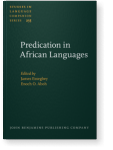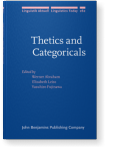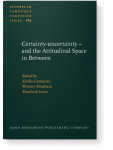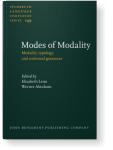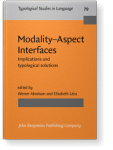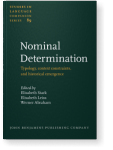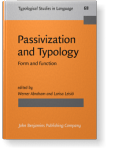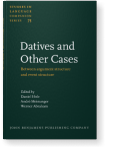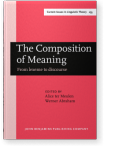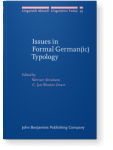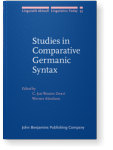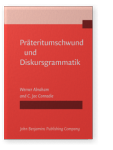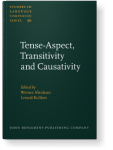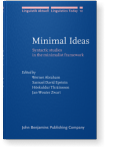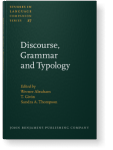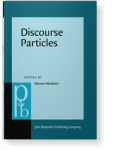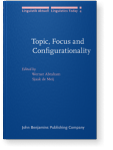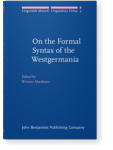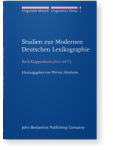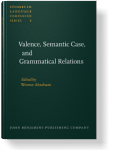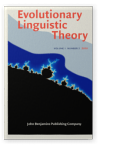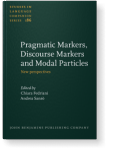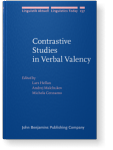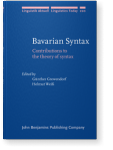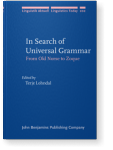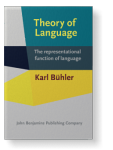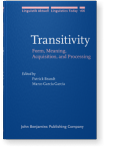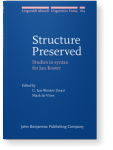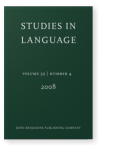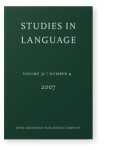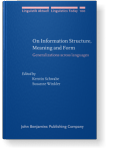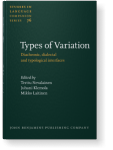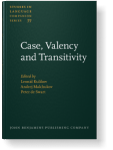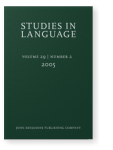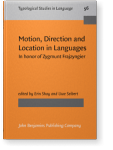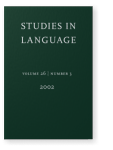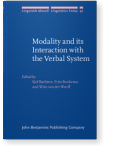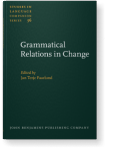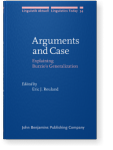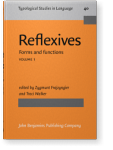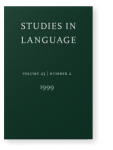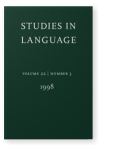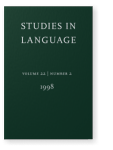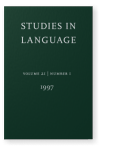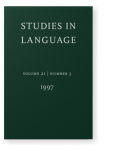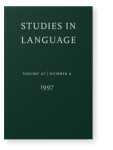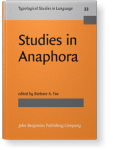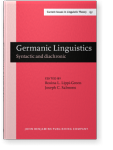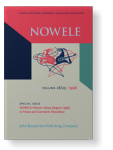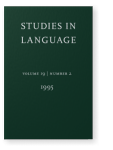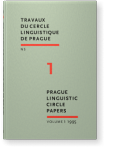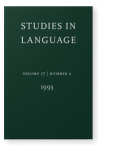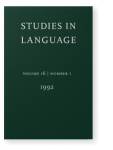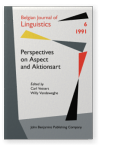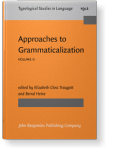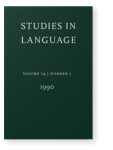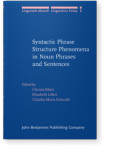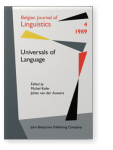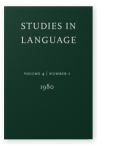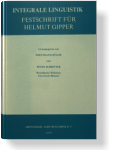Werner Abraham
List of John Benjamins publications for which Werner Abraham plays a role.
Book series
Thetics and Categoricals
Edited by Werner Abraham, Elisabeth Leiss and Yasuhiro Fujinawa
[Linguistik Aktuell/Linguistics Today, 262] 2020. vii, 390 pp.
Subjects Semantics | Syntax | Theoretical linguistics
Certainty-uncertainty – and the Attitudinal Space in Between
Edited by Sibilla Cantarini, Werner Abraham and Elisabeth Leiss
[Studies in Language Companion Series, 165] 2014. x, 365 pp.
Subjects Cognition and language | Discourse studies | Philosophy | Pragmatics | Semantics | Theoretical linguistics
Modes of Modality: Modality, typology, and universal grammar
Edited by Elisabeth Leiss and Werner Abraham
[Studies in Language Companion Series, 149] 2014. vi, 511 pp.
Subjects Semantics | Syntax | Theoretical linguistics | Typology
Modality–Aspect Interfaces: Implications and typological solutions
Edited by Werner Abraham and Elisabeth Leiss
[Typological Studies in Language, 79] 2008. xxiv, 422 pp.
Subjects Semantics | Syntax | Theoretical linguistics | Typology
Nominal Determination: Typology, context constraints, and historical emergence
Edited by Elisabeth Stark, Elisabeth Leiss and Werner Abraham
[Studies in Language Companion Series, 89] 2007. viii, 370 pp.
Subjects Historical linguistics | Semantics | Syntax | Typology
Passivization and Typology: Form and function
Edited by Werner Abraham and Larisa Leisiö
[Typological Studies in Language, 68] 2006. x, 553 pp.
Subjects Semantics | Syntax | Theoretical linguistics | Typology
Datives and Other Cases: Between argument structure and event structure
Edited by Daniel Hole, André Meinunger and Werner Abraham
[Studies in Language Companion Series, 75] 2006. viii, 385 pp.
Subjects Semantics | Syntax | Theoretical linguistics
The Composition of Meaning: From lexeme to discourse
Edited by Alice G.B. ter Meulen and Werner Abraham
[Current Issues in Linguistic Theory, 255] 2004. vi, 230 pp.
Subjects Discourse studies | Generative linguistics | Pragmatics | Semantics | Syntax | Theoretical linguistics | Typology
Issues in Formal German(ic) Typology
Edited by Werner Abraham and Jan-Wouter Zwart
[Linguistik Aktuell/Linguistics Today, 45] 2002. xviii, 336 pp.
Subjects Generative linguistics | Germanic linguistics | Theoretical linguistics | Typology
Studies in Comparative Germanic Syntax: Proceedings from the 15th Workshop on Comparative Germanic Syntax (Groningen, May 26–27, 2000)
Edited by Jan-Wouter Zwart and Werner Abraham
[Linguistik Aktuell/Linguistics Today, 53] 2002. xiv, 407 pp.
Subjects Comparative linguistics | Generative linguistics | Germanic linguistics | Theoretical linguistics
Präteritumschwund und Diskursgrammatik: Präteritumschwund in gesamteuropäischen Bezügen: areale Ausbreitung, heterogene Entstehung, Parsing sowie diskursgrammatische Grundlagen und Zusammenhänge
Werner Abraham und C. Jac Conradie
[Not in series, 103] 2001. xiv, 148 pp.
Subjects Germanic linguistics | Historical linguistics | Syntax
Tense-Aspect, Transitivity and Causativity: Essays in honour of Vladimir Nedjalkov
Edited by Werner Abraham and Leonid Kulikov
[Studies in Language Companion Series, 50] 1999. xxxiv, 359 pp.
Subjects Semantics | Theoretical linguistics | Typology
Minimal Ideas: Syntactic studies in the minimalist framework
Edited by Werner Abraham, Samuel David Epstein, Höskuldur Thráinsson and Jan-Wouter Zwart
[Linguistik Aktuell/Linguistics Today, 12] 1996. xii, 364 pp.
Subjects Generative linguistics | Syntax
Discourse, Grammar and Typology: Papers in honor of John W.M. Verhaar
Edited by Werner Abraham, T. Givón and Sandra A. Thompson
[Studies in Language Companion Series, 27] 1995. xx, 352 pp.
Subjects Discourse studies | Functional linguistics | Pragmatics | Typology
Discourse Particles: Descriptive and theoretical investigations on the logical, syntactic and pragmatic properties of discourse particles in German
Edited by Werner Abraham
[Pragmatics & Beyond New Series, 12] 1991. viii, 338 pp.
Subjects Discourse studies | Germanic linguistics | Pragmatics | Syntax | Theoretical linguistics
Topic, Focus and Configurationality: Papers from the 6th Groningen Grammar Talks, Groningen, 1984
Edited by Werner Abraham and Sjaak de Meij
[Linguistik Aktuell/Linguistics Today, 4] 1986. v, 349 pp.
Subjects Semantics | Syntax | Theoretical linguistics
On the Formal Syntax of the Westgermania: Papers from the 3rd Groningen Grammar Talks (3e Groninger Grammatikgespräche), Groningen, January 1981
Edited by Werner Abraham
[Linguistik Aktuell/Linguistics Today, 3] 1983. vi, 242 pp.
Subjects Germanic linguistics | Syntax | Theoretical linguistics
Studien zur Modernen Deutschen Lexikographie: Auswahl aus den Lexikographischen Arbeiten. Erweitert um drei Beiträge von Helene Malige-Klappenbach
Ruth Klappenbach (1911–1977)
[Linguistik Aktuell/Linguistics Today, 1] 1980. xxiii, 313 pp.
Subjects Germanic linguistics | Lexicography
Valence, Semantic Case, and Grammatical Relations: Workshop studies prepared for the 12th International Congress of Linguists, Vienna, August 29th to September 3rd, 1977
Edited by Werner Abraham
[Studies in Language Companion Series, 1] 1978. xiv, 729 pp.
Subjects Semantics | Syntax | Theoretical linguistics
Ut videam: Contributions to an understanding of linguistics. For Pieter Verburg on the occasion of his 70th birthday
Edited by Werner Abraham
[Not in series - Grüner, 123] 1975. 300 pp. + 1 photo.
Subjects Theoretical linguistics
2020 Chapter 1. Mood alternations in the history of German: The architecture of epistemic weakening Brazilian Portuguese, Syntax and Semantics: 20 years of Núcleo de Estudos Gramaticais, Pires De Oliveira, Roberta, Ina Emmel and Sandra Quarezemin (eds.), pp. 33–66 | Chapter
Non-veridicality is at the heart of more than just the verbal subjunctive. The main distinction we drew is the free application of the subjunctive and the non-veridical mood in dependent sentences. Greek and the Romance languages are among the representatives of this syntactic-semantic design of… read more
2020 From philosophical logic to linguistics: The architecture of information autonomy: Categoricals vs. Thetics revisited Thetics and Categoricals, Abraham, Werner, Elisabeth Leiss and Yasuhiro Fujinawa (eds.), pp. 225–282 | Chapter
How are the logical terms of thetic and categorical judgments to be distinguished linguistically? The key questions are how judgments can be thought of in terms of linguistics and what the deeper lying reason is for distinguishing the two notions. In our search for an answer, we can be guided by… read more
2020 Introduction : What this volume is about Thetics and Categoricals, Abraham, Werner, Elisabeth Leiss and Yasuhiro Fujinawa (eds.), pp. 1–10 | Chapter
2020 Chapter 8. Discourse particles in thetic judgments, in dependent sentences, and in non-finite phrases Information-Structural Perspectives on Discourse Particles, Modicom, Pierre-Yves and Olivier Duplâtre (eds.), pp. 195–222 | Chapter
I survey the discourse effects and conditions of selection of the German modal (discourse) particles on the basis of different questions that have always been in the focus of analytical descriptions (cf. Whitt 2015), which, however, can be formulated more clearly today. Special attention will be… read more
2019 What are the guiding principles in the evolution of language: Paradigmatics or syntagmatics? Evolutionary Linguistic Theory 1:2, pp. 109–142 | Article
The main designs of modern theories of syntax assume a process of syntagmatic organization. However, research on first language acquisition leaves no doubt that the structured combination of single lexical items cannot begin until a critical mass of lexical items has been acquired such that the… read more
2017 Chapter 6. Modal particles and Verum focus: New corollaries Pragmatic Markers, Discourse Markers and Modal Particles: New perspectives, Fedriani, Chiara and Andrea Sansó (eds.), pp. 171–202 | Chapter
The paper pursues two goals: first, comparing the behavior of speech act adverbials with modal particles, and second, the kinship of verum focus and modal particles with respect to their function in discourse. I explore the main difference between German(ic) grammatical modal particles and… read more
2017 Multiple case binding – The principled underspecification of case exponency Contrastive Studies in Verbal Valency, Hellan, Lars, Andrej L. Malchukov and Michela Cennamo (eds.), pp. 27–82 | Chapter
2014 The Upper German differential: main Austrian-Bavarian vs. (High) Alemannic differences Bavarian Syntax: Contributions to the theory of syntax, Grewendorf, Günther and Helmut Weiß (eds.), pp. 305–336 | Article
This essay is essentially a list of phenomena taken from the two large dialect areas of what is called Upper German (for German Oberdeutsch, South German (SG henceforth), comprising Austrian and Bavarian dialects as well as High Alemannic). The author himself speaks natively (base and high school)… read more
2014 Certainty: its conceptual differential in Accessible World Semantics Certainty-uncertainty – and the Attitudinal Space in Between, Cantarini, Sibilla, Werner Abraham and Elisabeth Leiss (eds.), pp. 29–45 | Article
This paper marks an attempt at coming to grips with the notion of certainty and degrees thereof. Where certainty has to do with propositional truth, we have become aware of hefty criticism by philosophers critical of analytic philosophy, most prominently Richard Rorty (1967 in “The Linguistic… read more
2014 A rare case of covert modality: Spoken Polish and the novel periphrastic past with mieć ‘have’ Modes of Modality: Modality, typology, and universal grammar, Leiss, Elisabeth and Werner Abraham (eds.), pp. 409–456 | Article
Our point of departure is a twofold observation. There is, first, a new periphrastic past in spoken Polish using a Slavic newcomer in this temporal construction, namely mieć “have”+P(ast) P(articiple) of a lexical verb. The Polish temporal paradigm is thus enriched by an analytic past form similar… read more
2014 Introduction Modes of Modality: Modality, typology, and universal grammar, Leiss, Elisabeth and Werner Abraham (eds.), pp. 1–16 | Article
2013 The developmental logic of the analytic past in German and Polish: An issue of universalism or areal contact? In Search of Universal Grammar: From Old Norse to Zoque, Lohndal, Terje (ed.), pp. 175–194 | Article
Other than Russian, but to all appearances like Czech, Polish is developing a new auxiliary from mieć “have, possess” that it can use for the hitherto unknown analytic past. We aim to observe what the status of this innovation in Polish is: whether or not it is to be tracked back to a contact… read more
2011 Spoken syntax in Cimbrian of the linguistic islands in Northern Italy- and what they (do not) betray about language universals and change under areal contact with Italo-Romance Studies on German-Language Islands, Putnam, Michael T. (ed.), pp. 233–278 | Article
This article is on Cimbrian German, an old enclave dialect in Upper Italy surrounded by Italo-Romance dialects. Next to clear traces of German clausal syntax, it shows Romance characteristics, which could be due to borrowing from the surrounding Italo-Romance majority dialects. Pertinent literature… read more
2011 Verbs of motion: Impersonal passivization between unaccusativity and unergativity Impersonal Constructions: A cross-linguistic perspective, Malchukov, Andrej L. and Anna Siewierska (eds.), pp. 91–126 | Article
Motion verbs (VoM) are discussed as examples of exceptions to the definition of unaccusativity. The problem arises under impersonal passivization (IPass): VoM may, on the one hand, be subjected to impersonal passivization, but, on the other hand, they turn out as ergative verbs/unaccusatives in… read more
2011 Preface Theory of Language: The representational function of language, Bühler, Karl, pp. xiii–xlvii | Preface
2010 Types of transitivity, intransitive objects, and untransitivity – and the logic of their structural designs: Ways to keep apart derivation in syntax and in the lexicon Transitivity: Form, Meaning, Acquisition, and Processing, Brandt, Patrick and Marco García García (eds.), pp. 15–68 | Article
This discussion is on diathetic derivative relations between verbs and their distribution between the syntactic component and the lexicon. We investigate whether or not the lexicon of verbs can be based on derivative relations such that there is only one basic type of verb – let us assume,… read more
2010 Unaccusative verbs in Chinese: Derivation in the lexicon or in syntax? Structure Preserved: Studies in syntax for Jan Koster, Zwart, Jan-Wouter and Mark de Vries (eds.), pp. 1–12 | Article
2008 On the logic of generalizations about cross-linguistic aspect-modality links Modality–Aspect Interfaces: Implications and typological solutions, Abraham, Werner and Elisabeth Leiss (eds.), pp. 3–13 | Article
In what follows the attempt is made, in all due brevity and succinctness, to gain more solid insight into links between aspect and modality as observed to hold in German and other West and North Germanic languages in Abraham (1990a, b, 2001, 2002, 2005). The basic idea (developed in more detail in… read more
2008 Review of Davis (2006): Comparative syntax of Old English and Old Icelandic Studies in Language 32:4, pp. 997–999 | Review
2008 Introduction: Aspect-modality interfaces and interchanges across languages Modality–Aspect Interfaces: Implications and typological solutions, Abraham, Werner and Elisabeth Leiss (eds.), pp. xi–xxiv | Miscellaneous
2007 Discourse binding: DP and pronouns in German, Dutch, and English Nominal Determination: Typology, context constraints, and historical emergence, Stark, Elisabeth, Elisabeth Leiss and Werner Abraham (eds.), pp. 21–47 | Article
Grammatical determiners of various sorts are differently distributed in individual languages. We will list and investigate briefl y a few related and non-related languages to survey the lexical lexemes relating to Determiner (DemPro) status vs. Article status and pronominal anaphor (PersPro). A… read more
2007 Kristin Melum Eide. 2005. Norwegian modals [Studies in Generative Grammar 74] Studies in Language 31:4, pp. 911–914 | Miscellaneous
2007 The discourse-functional crystallization of DP from the original demonstrative Nominal Determination: Typology, context constraints, and historical emergence, Stark, Elisabeth, Elisabeth Leiss and Werner Abraham (eds.), pp. 241–256 | Article
In Abraham (this volume), grammatical determiners of various sorts were discussed in regard of the extent to which such determiners co-define anaphors in contexts reaching beyond the single clause. Making use of its findings, the present discussion shows how the defi nite article emerged in the… read more
2007 Topic, focus and default vs. contrastive accent: typological differences with respect to discourse prominence On Information Structure, Meaning and Form: Generalizations across languages, Schwabe, Kerstin and Susanne Winkler (eds.), pp. 183–203 | Article
2007 Introduction Nominal Determination: Typology, context constraints, and historical emergence, Stark, Elisabeth, Elisabeth Leiss and Werner Abraham (eds.), pp. 1–20 | Miscellaneous
2006 The compositional nature of the passive: Syntactic vs. event semantic triggers. "Argument Hypothesis" vs. "Aspect Hypothesis" Passivization and Typology: Form and function, Abraham, Werner and Larisa Leisiö (eds.), pp. 462–501 | Article
It is claimed that in languages without a synthetic passive verbal morphology, the passive diathesis is compositional derived by implication or radical underspecification rather than generated in a direct way. As finitizing auxiliaries, equivalents of BE/ESSERE or HAVE/HAB¯ERE are employed together… read more
2006 Datives: structural vs. inherent — abstract vs. morphological — autonomous vs. combinatory — universally vs. language-specifically configured Datives and Other Cases: Between argument structure and event structure, Hole, Daniel, André Meinunger and Werner Abraham (eds.), pp. 3–46 | Article
2006 Introduction: Passivization and typology: Form vs. function - a confined survey into the research status quo Passivization and Typology: Form and function, Abraham, Werner and Larisa Leisiö (eds.), pp. 1–27 | Miscellaneous
2006 Dialect and typology: Where they meet — and where they don’t Types of Variation: Diachronic, dialectal and typological interfaces, Nevalainen, Terttu, Juhani Klemola and Mikko Laitinen (eds.), pp. 243–267 | Article
2006 Bare and prepositional differential case marking: The exotic case of German (and Icelandic) among all of Germanic Case, Valency and Transitivity, Kulikov, Leonid, Andrej L. Malchukov and Peter de Swart (eds.), pp. 115–145 | Article
2006 The impersonal passive: voice suspended under aspectual conditions Passivization and Typology: Form and function, Abraham, Werner and Larisa Leisiö (eds.), pp. 502–517 | Article
2004 VP-internal subjects as ‘unaccusatives’: Burzio’s ‘Object Account’ vs. the ‘Perfectivity Account’ The Composition of Meaning: From lexeme to discourse, Meulen, Alice G.B. ter and Werner Abraham (eds.), pp. 83–114 | Article
2004 The composition of meaning The Composition of Meaning: From lexeme to discourse, Meulen, Alice G.B. ter and Werner Abraham (eds.), pp. 1–16 | Article
2003 The myth of doubly governing prepositions in German Motion, Direction and Location in Languages: In honor of Zygmunt Frajzyngier, Shay, Erin and Uwe Seibert (eds.), pp. 19–38 | Article
2002 Book notice: “The dictionary of historical and comparative linguistics” by R. L. Trask Studies in Language 26:3, pp. 736–737 | Miscellaneous
2002 Modal verbs: Epistemics in German and English Modality and its Interaction with the Verbal System, Barbiers, Sjef, Frits Beukema and Wim van der Wurff (eds.), pp. 19–50 | Article
2002 Introduction Issues in Formal German(ic) Typology, Abraham, Werner and Jan-Wouter Zwart (eds.), pp. ix–xviii | Miscellaneous
2002 German clause structure under discourse functional weight: Focus and antifocus Issues in Formal German(ic) Typology, Abraham, Werner and Jan-Wouter Zwart (eds.), pp. 1–43 | Article
2001 How far does semantic bleaching go: About grammaticalization that does not terminate in functional categories Grammatical Relations in Change, Faarlund, Jan Terje (ed.), pp. 15–63 | Article
According to influential work on grammaticalization, the route grammaticalizing changes take is from lexical to functional categories (Lehmann 1985, van Gelderen 1993). It will be demonstrated on two grammatical relations that this is a too specific assumption. First, modal particles in German and… read more
2001 12. SVOV in German and Dutch: Interface between discourse prominence and subject identification as a parsing requirement Reflections on Language and Language Learning: In honour of Arthur van Essen, Bax, Marcel and Jan-Wouter Zwart (eds.), pp. 155–167 | Chapter
2000 The Aspect-case Typology Correlation: Perfectivity and Burzio’s Generalization Arguments and Case: Explaining Burzio’s Generalization, Reuland, Eric J. (ed.), pp. 131–193 | Article
2000 The structural and lexical space between reflexive binding and logophorics: Sundry paradigms of reflexives and anaphora Reflexives: Forms and functions, Frajzyngier, Zygmunt and Traci Walker (eds.), pp. 75–102 | Article
1999 Discussant Paper Referring to the Syntax Position Papers by Howard Lasnik and Mickey Noonan Functionalism and Formalism in Linguistics: Volume I: General papers, Darnell, Michael, Edith A. Moravcsik, Michael Noonan, Frederick J. Newmeyer and Kathleen Wheatley (eds.), pp. 55–86 | Article
1999 How descending is ascending German? On the deep interrelations between tense, aspect, pronominality, and ergativity Tense-Aspect, Transitivity and Causativity: Essays in honour of Vladimir Nedjalkov, Abraham, Werner and Leonid Kulikov (eds.), pp. 253–292 | Article
1998 Anatole V. Lyovin, An introduction to the languages of the world Studies in Language 22:3, pp. 742–743 | Squib
1998 Dodd, B.; Eckhard-Black, Chr.; Klapper, J.; Whittle, R. 1997. Modern German grammar Studies in Language 22:2, pp. 521–522 | Miscellaneous
1998 R.L. Trask. Historical Linguistics Studies in Language 22:2, pp. 522–523 | Miscellaneous
1997 Dictionary of European Proverbs. Collected by Emanuel Strauss Studies in Language 21:1, pp. 243–244 | Squib
1997 Review of König & Van der Auwera (1994): The Germanic Languages Studies in Language 21:2, pp. 428–433 | Review
1997 Dixon, R.M.W. Ergativity Studies in Language 21:1, pp. 237–240 | Squib
1996 The Discourse-referential and Typological Motivation of Pronominal Procliticization vs. Encliticization Studies in Anaphora, Fox, Barbara A. (ed.), pp. 1–32 | Article
1996 German standard pronouns and non-standard pronominal clitics Typological corollaries Germanic Linguistics: Syntactic and diachronic, Lippi-Green, Rosina L. and Joseph C. Salmons (eds.), pp. 1–14 | Article
1996 "Ersatzinfinitiv" und Verbanhebung in der Westgermania NOWELE Volume 28/29 (August 1996): A Frisian and Germanic Miscellany, Petersen, Adeline and Hans Frede Nielsen † (eds.), pp. 273–295 | Article
1995 Diathesis: The Middle, Particularly in West-Germanic Discourse, Grammar and Typology: Papers in honor of John W.M. Verhaar, Abraham, Werner, T. Givón and Sandra A. Thompson (eds.), pp. 3–48 | Article
1995 Structural Properties of Information Packaging in German and in Universal Grammar Prague Linguistic Circle Papers: Travaux du cercle linguistique de Prague nouvelle série, Hajičová, Eva, Miroslav Červenka, Oldřich Leška † and Petr Sgall (eds.), pp. 125–156 | Article
1993 Hermann Paul. Deutsches Wörterbuch Studies in Language 17:2, p. | Squib
1992 Event structure accounting for the emerging periphrastic tenses and the passive voice in German Explanation in Historical Linguistics, Davis, Garry W. and Gregory Iverson (eds.), pp. 1–16 | Article
1992 Olaf Thynen and Michael Clark (eds). The Concise Oxford-Duden German Dictionay Studies in Language 16:1, pp. 260–261 | Miscellaneous
1991 How Much of the German Tense System is "Aspect" and "Aktionsart"? Perspectives on Aspect and Aktionsart, Vetters, Carl and Willy Vandeweghe (eds.), pp. 133–150 | Article
1991 The grammaticization of the German modal particles Approaches to Grammaticalization: Volume II. Types of grammatical markers, Traugott, Elizabeth Closs and Bernd Heine (eds.), pp. 331–380 | Article
1990 Review of Weydt (1989): Sprechen mit Partikeln Studies in Language 14:1, pp. 225–234 | Review
1989 Verbal Substantives in German Syntactic Phrase Structure Phenomena in Noun Phrases and Sentences, Bhatt, Christa, Elisabeth Löbel and Claudia Maria Schmidt (eds.), pp. 79–98 | Article
1989 Language Universals: The Chomskyan Approach vs. Greenberg's Typological Approach Universals of Language, Kefer, Michel and Johan van der Auwera (eds.), pp. 9–25 | Article
1986 Word Order in the Middle Field of the German Sentence Topic, Focus and Configurationality: Papers from the 6th Groningen Grammar Talks, Groningen, 1984, Abraham, Werner and Sjaak de Meij (eds.), pp. 15–38 | Article
1986 Introduction Topic, Focus and Configurationality: Papers from the 6th Groningen Grammar Talks, Groningen, 1984, Abraham, Werner and Sjaak de Meij (eds.), pp. 1–14 | Miscellaneous
1983 The Control Relation in German On the Formal Syntax of the Westgermania: Papers from the 3rd Groningen Grammar Talks (3e Groninger Grammatikgespräche), Groningen, January 1981, Abraham, Werner (ed.), pp. 217–242 | Article
1979 Methodische Übungen zu Kafka-Interpretationen Integrale Linguistik: Festschrift für Helmut Gipper, Bülow, Edeltraud und Peter Schmitter (Hrsg.), pp. 379–404 | Article
1978 Valence and case: Remarks on their contribution to the identification of grammatical relations Valence, Semantic Case, and Grammatical Relations: Workshop studies prepared for the 12th International Congress of Linguists, Vienna, August 29th to September 3rd, 1977, Abraham, Werner (ed.), pp. 695–729 | Article

